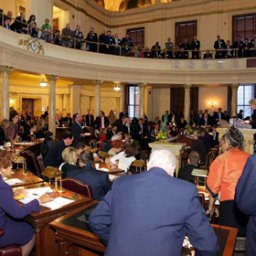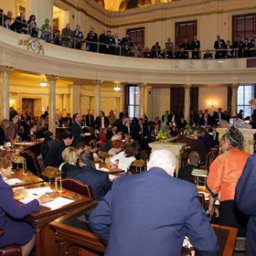
Would Create Escalating Penalties And Public Education Program To Deter Texting While Driving
TRENTON – Legislation sponsored by Senators Richard J. Codey (D – Essex, Morris) and Fred H. Madden (D – Gloucester, Camden) that would address the epidemic of hands-free violations by drivers engaging in dangerous distractions while behind the wheel gained final approval by the state Senate yesterday.
“Several studies have shown that distracted drivers pose a very serious risk to themselves and other motorists on the road – often at a level that is just as dangerous, if not more dangerous than drunk driving,” said Codey. “New Jersey cannot ignore the serious and often fatal consequences of texting while driving. We need laws on the books that will act as a real deterrent to this risky behavior, and hopefully make people think twice before they reach for their cell phone while driving.”
A recent study by the Centers for Disease Control and Prevention study that showed approximately 58 percent of high school seniors nationwide said they had texted or emailed while driving during the previous month.
The bill, S-69, would put in place a graduated penalty structure for repeat offenders who violate the state’s hands-free cell phone law more than once in a ten-year period – a motor vehicle violation that now carries a $100 fine for each offense. The bill increases the fines to $200 to $400 for a first offense, $400 to $600 for a second offense, and $600 to $800 and a 90-day driver’s license suspension for the third or subsequent offenses. The fines would be divided equally between the county and municipality where the violation occurred and the Motor Vehicle Commission for use in a public education program.
Under the bill, first-time offenders would have to pay a fine of $200. Drivers convicted of a second offense within 10 years of the first would have to pay a fine of $400, and drivers convicted of a third and subsequent offenses within 10 years of the first would have to pay a fine of $600 and face driver’s license suspension of up to 90 days. The fines would go towards a public information program to educate motorists about the dangers of texting while driving.
“This legislation is intended to save lives and make people think twice before putting themselves and others at risk,” said Madden. “This bill takes a two-prong approach to addressing dangerous driving practices. Increasing penalties for those who commit this offense and directing these fines to educate the public about the dangers of texting while driving will go a long way in reducing this dangerous trend.”
In December 2011, the National Transportation Safety Board called for a nationwide ban on the use of cell phones and text messaging devices while driving. A 2010 Car and Driver Magazine report showed how long it took to hit the brake when sober (.54 seconds), drunk (add four feet), reading an e-mail (add 36 feet) and sending a text message (add 70 feet). The Transport Research Laboratory study showed that reaction times were 35% worse for drivers sending a text message, as opposed to 12% worse for those at the legal limit of intoxication and 21% worse for those under the influence of cannabis. A study prepared by the Virginia Tech Transportation Institute found that text messaging took drivers’ focus away for 4.6 seconds, and a Clemson University simulator study found that text messaging and using an iPod caused drivers to leave their lanes ten percent more often.
In addition, a study by the American Journal of Public Health noted that, if not for texting while driving, the number of deaths caused by distracted driving would have dropped every year from 2002 to 2007, from 4,611 deaths nationwide in 2001 to 1,925 in 2007. Instead, the study found a 19 percent increase in auto fatalities for every 1 million additional cell phone subscribers, and an increase to 5,870 deaths caused in 2008 due to distracted driving.
The bill now heads to the governor for consideration.



